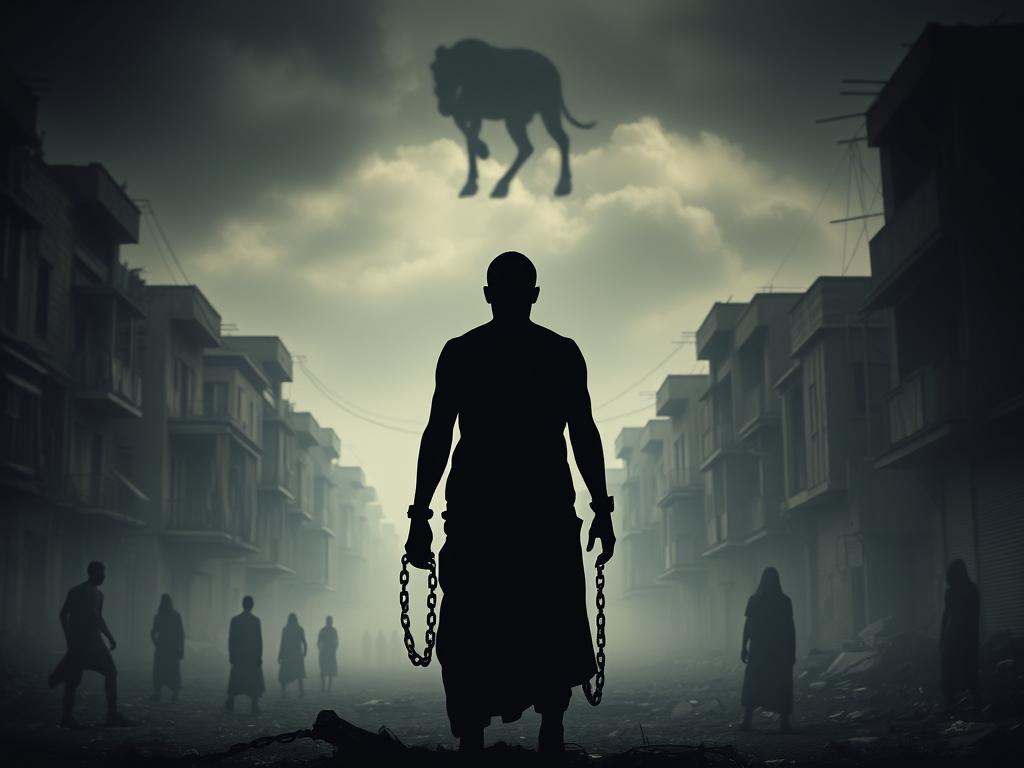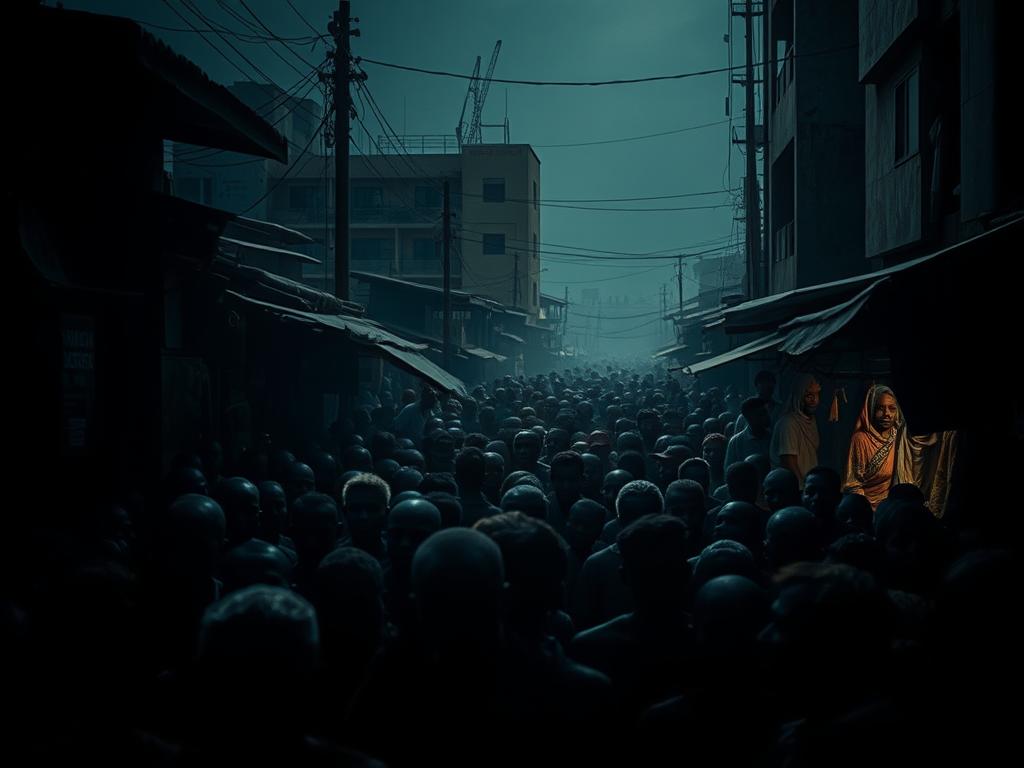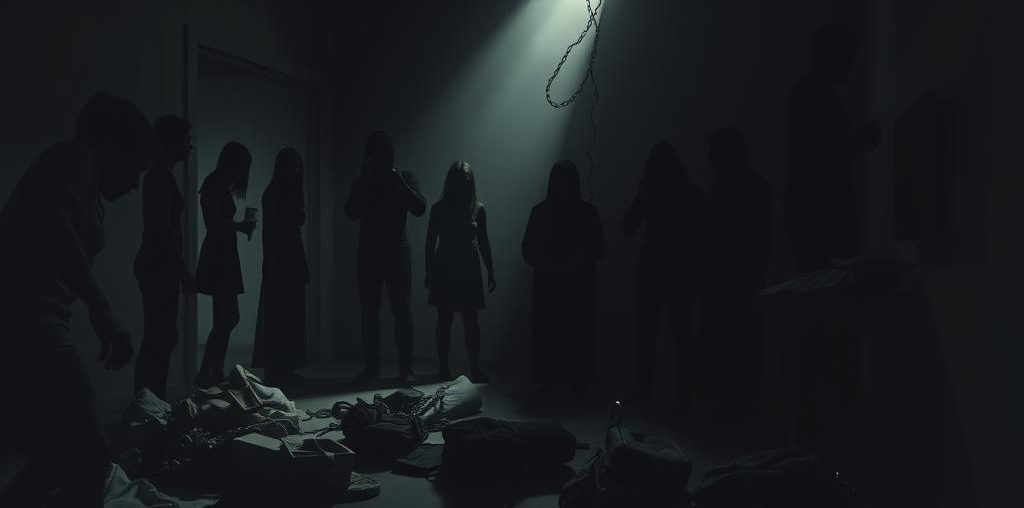Nigeria, the most populous country in Africa, has sadly become a center for human trafficking. This is a disturbing form of modern-day slavery. This case study looks into the harsh realities of human trafficking in Nigeria. It covers the scope, types of exploitation, and efforts to fight this big issue.
Human trafficking is a complex issue in Nigeria. For instance, people face different kinds of exploitation, such as sex trafficking and forced labor. Moreover, the problem is huge, as Nigeria is both a source and a destination for victims.

This article aims to provide a deeper understanding of human trafficking in Nigeria. Specifically, it looks at what makes it so common, the hurdles faced by law enforcement and civil groups, and the effects on victims. Ultimately, we hope to raise awareness and encourage action to fight human trafficking while also protecting the vulnerable in Nigeria.
The Harsh Reality of Modern Slavery
Human trafficking, a widespread form of modern slavery, casts a dark shadow across many parts of the world, including Nigeria. In particular, this crime involves the exploitation of people, often through sex trafficking or forced labor. As such, it’s a serious issue that demands our attention.
Understanding the Scope of Human Trafficking
In Nigeria, human trafficking is a huge and complex issue. Each year, thousands of Nigerians, especially women and children, face this exploitation. Often, they are lured with promises of better jobs, but instead, they end up trapped in a cycle of human trafficking and modern slavery.
Forms of Exploitation: Sex Trafficking and Forced Labor
Victims face many forms of exploitation, such as sex trafficking and forced labor. Specifically, sex trafficking involves being coerced into commercial sex work, often through trickery or force. In contrast, forced labor entails being made to work against their will in jobs like construction, farming, or cleaning, under terrible conditions.
- Sex trafficking: Victims are forced into commercial sex work, against their will.
- Forced labor: Victims are made to work in various industries, like building, farming, or cleaning, under harsh conditions.

The effects of human trafficking on individuals, communities, and society are profound. Since it’s a complex issue, it requires a wide-ranging solution. Therefore, this entails fostering collaboration between law enforcement, policymakers, and organizations that support society.
Human Trafficking in Nigeria: An Overview
Nigeria, the most populous country in Africa, faces a significant problem with human trafficking. Specifically, this form of modern slavery remains persistent. In this context, we will examine the history, scale, and underlying reasons behind this issue in Nigeria.
Human trafficking in Nigeria has a long history. Furthermore, it serves as both a source and a destination for victims. Specifically, poverty, economic problems, and conflict drive people, especially women and children, into trafficking. In addition, Nigeria’s location makes it a key hub for trafficking networks, with victims being exploited in Nigeria and other places.
Recent estimates show that human trafficking deeply affects Nigeria. For instance, thousands of citizens fall victim to exploitation, including sex trafficking and forced labor. Moreover, the problem persists due to high unemployment as well as a lack of education and job opportunities in some areas.

Many factors contribute to the persistence of human trafficking in Nigeria. Firstly, the crime is highly profitable. Additionally, organized crime groups are involved, and law enforcement struggles to combat it. Furthermore, the country’s weak borders and traffickers exploiting victims’ vulnerabilities also play a role in perpetuating the issue.
To fight human trafficking in Nigeria, we need a significant effort from many groups. This effort should involve the government, civil society, and international partners. In particular, creating strong laws, improving law enforcement, and tackling the root causes of vulnerability represent key steps.
Factors Contributing to Human Trafficking
Nigeria faces a tough battle with human trafficking due to many complex issues. Specifically, poverty, economic instability, conflict, and displacement are key factors. Consequently, these problems create vulnerabilities that traffickers exploit to their advantage.
Poverty and Economic Instability
Poverty and economic uncertainty push people towards human trafficking in Nigeria. Those struggling financially are tempted by traffickers’ lies of better jobs or lives. Poverty makes them easy targets, as they see no other way out.
Conflict and Displacement
Conflict and political instability in Nigeria increases the trafficking of people. Violence and wars leave people without homes or support. Traffickers then offer them a way to escape, promising safety and a better life.
These issues together create an ideal situation for traffickers. To stop this, we must tackle economic instability and conflict. We need to give people the support and protection they need to escape trafficking.

Trafficking Routes and Hotspots
Nigeria’s location and good transport links make it a key spot for trafficking of people and smuggling. Traffickers use these links to move victims through complex trafficking routes. They often cross borders to get to their final places.
In Nigeria, big cities like Lagos, Benin City, and Kano are hotspots for trafficking. Traffickers target people who are easy to trick. They promise them jobs and a better life, but then exploit and abuse them.
- Trafficking starts in rural Nigeria and moves to cities before crossing borders to places like Benin, Niger, and Libya.
- The Sahara Desert and the Mediterranean Sea are known trafficking routes. Traffickers use the hope of a better life in Europe to trick migrants.
- To move victims, traffickers use smuggling networks and bribes. They use fake documents and corrupt officials to get past border checks.
We need to work together across borders to stop these bad activities. This will help protect people from being exploited.

Victims of Human Trafficking
Human trafficking in Nigeria hits women and children the hardest. They are often pushed into it by poverty, conflict, and other tough situations. They get caught in a cycle of exploitation and abuse.
Women and Children: The Most Vulnerable
Most victims of trafficking in Nigeria are women and children. They are easy targets because of their vulnerability. Traffickers trick them with promises of a better life, then force them into sex trafficking and forced labor.
Nigerian women and girls are often forced into sexual exploitation for work in the sex industry, both in Nigeria and other countries. Children are forced into child labor and forced begging. Traffickers use their innocence and lack of resources against them.
- Women and children are the main victims of trafficking in Nigeria.
- Traffickers target them because they are very vulnerable, often due to poverty, conflict, and lack of resources.
- Women and girls face sexual exploitation, while children are forced into labor and begging.

The effects of human trafficking on women and children are huge. It leaves them with deep scars in their bodies, minds, and social lives. We must focus on helping them in the fight against this terrible crime.
Human Trafficking: A Lucrative Criminal Enterprise
Human trafficking has become a big money-maker in Nigeria. It’s a form of modern slavery driven by the desire for wealth. Criminal networks use the most vulnerable people for their own gain.
This crime is profitable because it’s cheap to run and traffickers can use victims over and over. They keep victims in line with threats, debt, and violence. This makes human trafficking a big business, with traffickers using smart ways to avoid the law and make a lot of money.
There are big economic reasons why people do this. Traffickers can make thousands of dollars from each person they exploit. The need for cheap labor and the sex trade in Nigeria makes this crime grow. Traffickers prey on those who want a better life.
Organized crime groups make human trafficking worse. They have the money, connections, and know-how to move victims across borders and avoid getting caught. This shows we need strong actions to stop this crime.

We must tackle the money-making side of human trafficking to stop it. We need to reduce the demand for cheap labor and sex, improve law enforcement, and help victims. These steps are key to fighting modern slavery.
Impact of Human Trafficking on Victims
Human trafficking has far-reaching effects that go beyond the act of exploitation. Victims face physical and psychological traumas. These can deeply affect their well-being and life quality.
Physical and Psychological Trauma
Trafficking victims often suffer severe physical abuse. This includes beatings, sexual assault, and torture. Such abuse can cause lasting physical injuries, chronic pain, and serious health issues.
The psychological toll is also huge. Victims deal with deep mental pain, depression, anxiety, and PTSD. This trauma can be overwhelming.
Social and Economic Consequences
The social and economic effects of trafficking are severe. Victims may struggle to fit back into their communities. They face stigma, discrimination, and social isolation.
Also, they have a hard time financially. They lack access to jobs, housing, and other resources needed to rebuild their lives.
The effects of human trafficking on trafficking victims are deep and long-lasting. Victims face physical trauma, psychological trauma, social consequences, and economic consequences. These scars can haunt them for years.

Helping trafficking victims is crucial in the fight against modern slavery. By recognizing the harm done, we can offer comprehensive support. This support includes efforts from policymakers, service providers, and community leaders. Ultimately, by working together, we can assist survivors in reclaiming their lives and futures.
Anti-Trafficking Efforts and Challenges
Nigeria has started many anti-trafficking projects to fight human trafficking. The government made strong legislation, like the Trafficking in Persons (Prohibition) Enforcement and Administration Act. This law makes human trafficking a crime and sets tough penalties for those who break it.
Law enforcement groups, like the National Agency for the Prohibition of Trafficking in Persons (NAPTIP), are working hard. They find, investigate, and charge people for trafficking. Thanks to them, many victims have been saved, and some traffickers have been caught.
But fighting human trafficking in Nigeria is hard. There’s not enough money, resources are scarce, and some government offices are corrupt. This makes it hard to stop trafficking. Also, there’s a big need for help for victims, like medical and mental support.
- Strengthening legislation to close legal gaps and make penalties for traffickers stricter
- Investing in strong law enforcement skills and training to get better at investigating and prosecuting
- Expanding victim support services, like shelter, counseling, and help getting back into society
- Working on the main reasons for human trafficking, like poverty and lack of jobs
- Spreading awareness and working with civil groups to help fight anti-trafficking efforts
We need a strong and ongoing plan to beat trafficking people in Nigeria. Facing these challenges is key to giving justice to victims and stopping the criminal networks behind this modern slavery.

The Role of Government and Civil Society
In the fight against human trafficking, the Nigerian government and civil society are key players. They work together, spread awareness, prevent trafficking, and protect victims. This teamwork is vital in tackling this serious crime.
The Nigerian government has made significant moves against trafficking of people. For instance, they set up specialized anti-trafficking agencies, such as the National Agency for the Prohibition of Trafficking in Persons (NAPTIP). This agency not only investigates cases but also goes after criminals and helps victims. In addition, the government created comprehensive legal frameworks to criminalize trafficking and protect victims’ rights.
Civil society groups in Nigeria are also fighting hard against human trafficking. They work hard to raise awareness about the issue. They teach people about the risks of trafficking and where to get help. These groups also offer crucial support services like shelter, counseling, and rehab to help victims start over.
Working together, the government and civil society are key to preventing and protecting against trafficking. Coordinated strategies that mix government policies, law enforcement, and community actions work best. This teamwork helps Nigeria improve its prevention mechanisms, protect victims better, and punish traffickers.
By joining forces, the government and civil society can spread greater awareness, create strong prevention programs, and ensure comprehensive protection for victims in Nigeria. This approach is vital in fighting this complex issue.

Conclusion
Human trafficking in Nigeria shows us the dark side of modern slavery. We’ve looked into how people are exploited, why they’re vulnerable, and how we’re fighting back.
This issue is complex and needs a big effort from many groups. The Nigerian government, civil groups, and international partners are working hard. They’re making laws stronger, helping victims, and breaking up trafficking rings.
However, poverty, conflict, and inequality continue to push people into trafficking. Therefore, we must keep fighting with strong actions. Additionally, we need to spread awareness, help those at risk, and ensure that everyone takes responsibility. By doing so, fighting human trafficking in Nigeria will remain a top priority.
FAQ
What is the scope of human trafficking in Nigeria?
Nigeria is a key player in human trafficking, being a source, transit, and destination country. It affects many, including women, children, and migrants. The issue includes sex trafficking and forced labor, making it a big problem.
What are the main forms of exploitation in human trafficking in Nigeria?
In Nigeria, human trafficking mainly involves sex trafficking and forced labor. Victims are forced into sex work or labor in areas like domestic work, farming, or building.
What are the key factors contributing to human trafficking in Nigeria?
Poverty, economic instability, conflict, and displacement drive human trafficking in Nigeria. These issues create conditions where traffickers can easily exploit people.
How do trafficking routes and hotspots operate in Nigeria?
Traffickers in Nigeria use complex networks to move and exploit victims. They target vulnerable migrants in cities and at borders. This involves human smuggling along trafficking routes.
Who are the most vulnerable victims of human trafficking in Nigeria?
Women and children, especially from poor or displaced backgrounds, are most at risk. Traffickers prey on their vulnerabilities, exploiting them in various ways.
How is human trafficking a lucrative criminal enterprise in Nigeria?
Human trafficking is very profitable in Nigeria, thanks to its financial rewards and organized criminal networks. Traffickers use smart strategies to make the most money, keeping the problem going.
What are the impacts of human trafficking on victims in Nigeria?
Victims suffer from physical and mental trauma, and face social and economic problems. The abuse they experience can deeply affect their lives and communities.
What are the challenges in the anti-trafficking efforts in Nigeria?
Despite laws and support for victims, fighting human trafficking in Nigeria is hard. Challenges include weak law enforcement, lack of resources, and societal barriers.
How do the government and civil society collaborate to address human trafficking in Nigeria?
The government and civil groups are key in fighting human trafficking. They work together to prevent trafficking, support victims, and raise awareness. Yet, more effort is needed for effective action.


